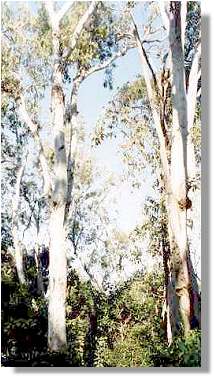| Name
Corymbia tessellaris commonly referred to as Moreton
Bay ash is from the family Myrtaceae. The botanical name is Latin, tessellaris,
meaning tessellated, referring to the distinctive lower proportion of
the bark being of a dark roughly square shaped scaly appearance. The bark
then has an abrupt change to a smooth white or greyish white bark above.
 Corymbia tessellaris
Corymbia tessellaris
Click to enlarge |
Characteristics
Corymbia tessellaris varies from a medium sized tree 12 –
15m in height to a tall tree reaching 35m in height and 1m d.b.h. The
trunk is nearly always straight and forms one-half to two thirds of the
total tree height, giving way to a crown of slender branches with pendulous
branchlets.
Moreton Bay ash may be found in warm semi-arid areas to hot humid areas,
and can tolerate a varying annual rainfall amount from 400mm to 3500mm
in the tropical areas where monsoon rainfall events occur. In higher rainfall
areas the species occur in open-forest formation, and in the drier inland
areas will mostly form woodlands. In many coastal areas C. tessellaris
occurs as a sclerophyll forest complete with an understorey of vine forest
species, often occurring as a result of decreased fire frequencies. The
trees may be found on extensive plains and undulating topography on many
soil types, however are know to suit deep sandy loams derived from sedimentary
rocks and on alluvial soils.
 Corymbia tessellaris
Corymbia tessellaris
Click to enlarge |
At Nelly Bay Habitat Reserve
Corymbia tessellaris tall open woodland has a varying canopy height
from 10-18m with a shrubby and grassy understory. Other locally common
species include Eucalyptus intermedia, E. alba, Melaleuca
leucadendra, Pleiogynium timorense and Canarium australianum.
A understory layer of shrubs includes Planchonia careya, Pandanus
spp., Alphitonia excelsa, Timonius timon and Acacia
spp. A ground layer is made up of Hyptis suaveolens, Heteropogon
contortus and H. triticeus.
|